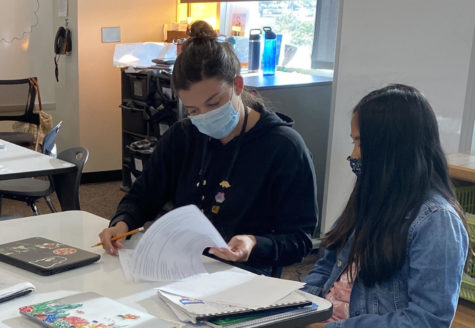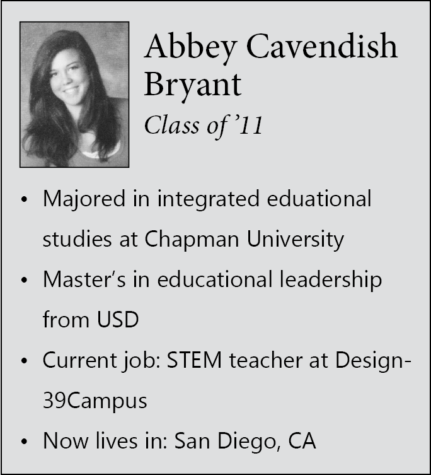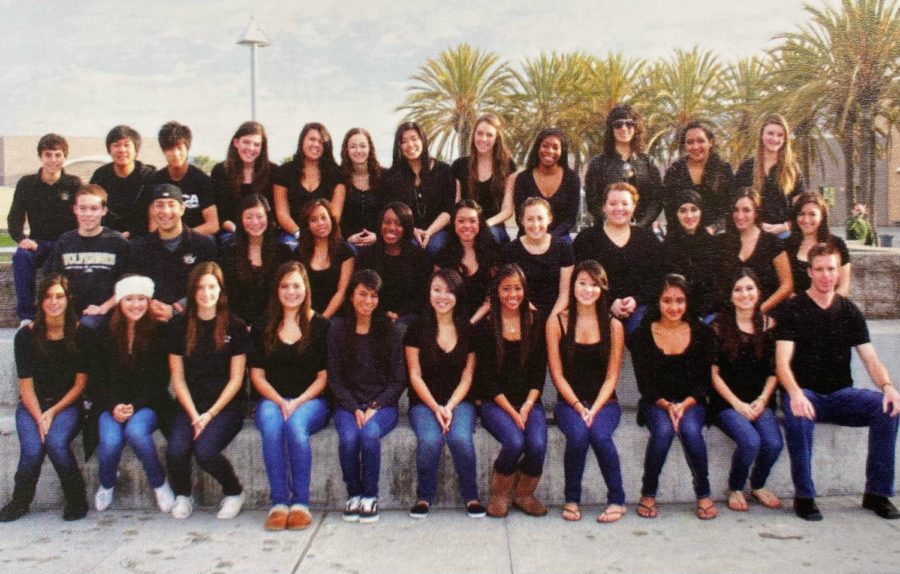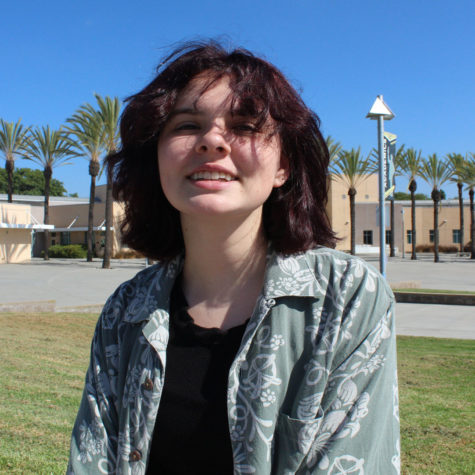Cavendish Bryant teaches STEM
Cavendish Bryant returns to PUSD to teach math and science at Design39Campus
December 17, 2021


Abbey Cavendish Bryant had known that she would become a teacher since a young age. According to Cavendish Bryant, what she envisioned for her career path following high school was almost identical to the one she actually followed. She said her biggest deviation was choosing to teach middle school rather than elementary.
“I decided I wanted to be a teacher when I was in second grade and I never changed my mind,” Cavendish Bryant said. “I remember having to share with my class what I wanted to be when I grew up. I declared that I wanted to be an Olympic athlete or a teacher. While becoming an [Olympian] was not in the cards, [I’ve] wanted to be a teacher ever since. Although I initially wanted to be an elementary school teacher, I found myself drawn to math education and how to improve it. My senior thesis was on mathematical mindsets and I knew that I wanted to start my career as a math teacher.”
Cavendish Bryant graduated with her teaching credentials for multiple subjects and mathematics, and received a Master’s degree in Educational Leadership from the University of San Diego in 2019. She now teaches math and science as a sixth grade STEM teacher at Design39Campus.
Cavendish Bryant said that working as a teacher at Design39 is her dream job. According to her, the thing she values most about teaching there is getting to know each of her students and how to help them in their academic journey.
“One of the many things I love about Design39 is that it is a smaller middle school, so we truly get to know all students,” Cavendish Bryant said. “I believe that relationships are the key to really powerful learning, both academically and social-emotionally. We get to develop relationships and build social skills and emotional literacy through intentional curriculum, [which] we develop collaboratively as grade level teams. We really care about our students and they care about us and each other, too.”
According to Cavendish Bryant, her early commitment to teaching allowed her to thoroughly map out her life after high school and into college. Her vision allowed her to make time in her schedule to focus on building her skills around education through extracurriculars and volunteer experiences.
After graduating, Cavendish Bryant returned to work as a teacher in her former school district. She volunteered at Deer Canyon after she graduated from college, an experience that allowed her to gain hands-on experience working in a classroom.
On top of this, she also stayed in touch with many of her former teachers in PUSD who connected her with their principals and provided mock interviews for her to practice.
“I credit this job to a lot of hard work and preparation, but also to the connections I made during my time as a student in PUSD,” Cavendish Bryant said. “Relationships are so essential. Taking the extra step to reach out and introduce yourself really goes a long way.”
As a high school student, Cavendish Bryant was a member of ASB and served as ASB president. According to her, the biggest takeaway from this experience was the importance of getting involved.
“You get what you give,” Cavendish Bryant said. “I wanted to impact the culture and community on campus, so involving myself in as many opportunities as possible was the best way to do that. I really valued the classes and experiences available to me during my time at Westview.”

Even though Cavendish Bryant gained a lot of knowledge and experience through her time as a student at Westview, she said she wishes there were more opportunities to develop better study habits and emotional regulation strategies.
“I remember a lot of meltdowns from the pressure to do well in AP classes and on SATs, [and] juggling extracurricular activities on top of all that,” Cavendish Bryant said. “I also remember a lot of trial and error as I found what study strategies and test-taking strategies worked for me.”
In her college days, despite her passion for mathematics, Cavendish Bryant said that she was still susceptible to stereotypes as a woman in STEM.
“In higher level math classes, female students were definitely the minority,” Cavendish Bryant said. “The expectations about what I could do in mathematics specifically were lower than the expectations many teachers, parents, and other students had for my male classmates.”
According to Cavendish Bryant, her parents, as well as some of her teachers, helped her overcome these stereotypes by encouraging her to pursue a subject she enjoyed and helping her see her own potential. She said being an accelerated math pathway teacher allows her to see how these lower expectations affect her students. The stereotypes she faced as a student influenced her approach to teaching STEM to her own students.
“I liked being successful in a subject that people didn’t expect me to be successful in or pursue,” Cavendish Bryant said. “I [also] see how we are starting to break down these negative stereotypes as new research about how we teach math comes out. Reversing [these] negative stereotypes has been a cornerstone of my teaching philosophy.”
Cavendish Bryant said her most important goal each year is to help students believe in themselves and their abilities the way her parents and teachers helped her.
“One of my most overarching and important goals each year is to help [students] understand that going faster in a subject does not mean being better at that subject. I want students to see how the math we learn matters in their lives. To see transformations in student mindsets from the start of the year to the end is one of the most rewarding parts of my job.”
Cavendish Bryant said that there were other challenges she faced as a student other than negative stereotypes. According to her, there is too much pressure placed on students to get into a good college. Although she never considered a path other than college, she said Westview students’ focus on college is over-blown.
“[I don’t think there’s] enough emphasis on helping students discover what they are passionate about,” Cavendish Bryant said. “I believe students could really benefit from exploring what they will find fulfilling after high school to set goals around that.”
Cavendish Bryant also said she gained knowledge and experience through college and the years following.
“After college and grad school, people really don’t care that much about what university you attended [or] what your GPA was,” Cavendish Bryant said. “What really matters are the connections you make with people along the way and that you find a path that will truly bring you happiness in life. I wish that I had been reminded to get out of the weeds, so to speak, and see a bigger picture to keep perspective around what I was working so hard for. Figure out what you love, find out how you can make that a part of your life, and set goals to pursue it. Then, as corny as it may sound, everything else will fall into place.”


